7 Bad Habits That Are Actually Good for You
Many of us have bad habits that we try hard to get rid of. But is that really necessary? What if we told you that gossiping helps develop friendly relationships, swearing helps relieve pain, and watching cat videos makes you more productive?
5-Minute Crafts would like to prove to you that bad habits can be useful too.
Chewing gum improves cognitive function and reduces stress levels.

A series of experiments conducted at the Department of Psychology at St. Lawrence University in Canton, New York examined the effects of chewing gum on cognitive function. The results showed that chewing gum provided performance advantages when gum was chewed for 5 minutes before, but not during, cognitive testing. The benefits, however, remained only for the first 15 to 20 minutes of the testing session. These restrictions are likely related to the arousal caused by chewing. However, due to the combined use of resources by the cognitive and chewing processes, the effect was reduced, and chewing gum only interfered with mental activity.
Another study found that chewing gum can help reduce stress levels. During the experiment, it was found that particular stress-specific emotions, like not feeling relaxed and feeling tense, significantly increased when participants refrained from chewing and decreased during chewing. However, more severe stress levels, like frustration or fright, were unaffected by chewing gum.
Light (but not super-thorough) washing helps keep your skin healthy.
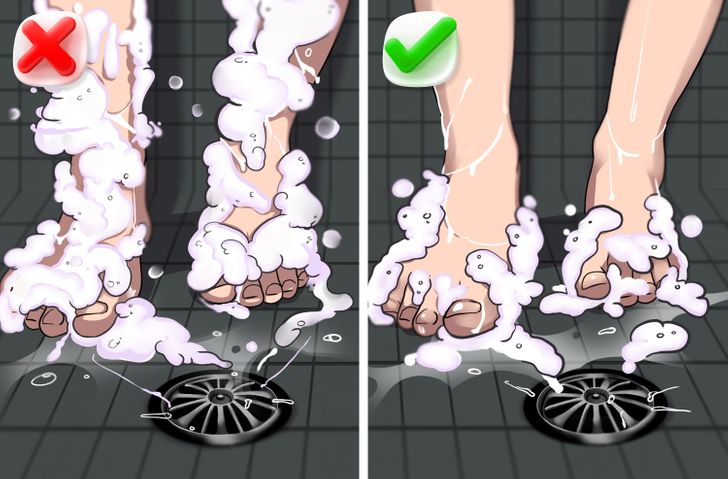
- The human microbiome is a natural defense of the body. It contributes to metabolic functions, protects against pathogens, supports the immune system, and influences most physiological processes directly or indirectly. So, when washing too frequently and using soap and gel, we wash off healthy bacteria. However, this is not a reason to shower only once a week or even less often.
- Dermatologists say it’s not so much how often you wash, but how you wash that matters. Dr. Casey Carlos, assistant professor of medicine in the division of dermatology at the University of California San Diego School of Medicine, says, “It’s the hardest thing to get people to use soap only where they need it.” Because soap is designed to remove oils from the skin, it dries the skin out. Therefore, Carlos suggests lathering only the areas that usually smell stronger — armpits, groin area, feet — and skip the chest, back, legs, and arms. The skin is capable of cleaning itself. It’s also recommended that you shower quickly and use warm water instead of hot water.
Wiggling movements burn calories.
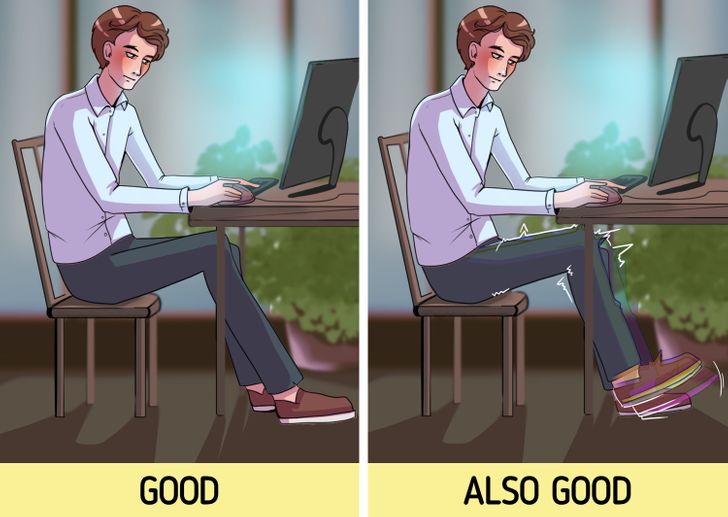
A study conducted by Dr. Jim Levine of the Mayo Clinic found that fidgeting, compulsive foot tapping, and other annoying movements that irritate others increase metabolism and may play a positive role in maintaining physical health.
Wiggling and compulsive movements are actually a form of thermogenesis not associated with exercise. This category covers the little things that we do throughout the day that result in burning calories.
Sharing gossip makes social connections stronger.
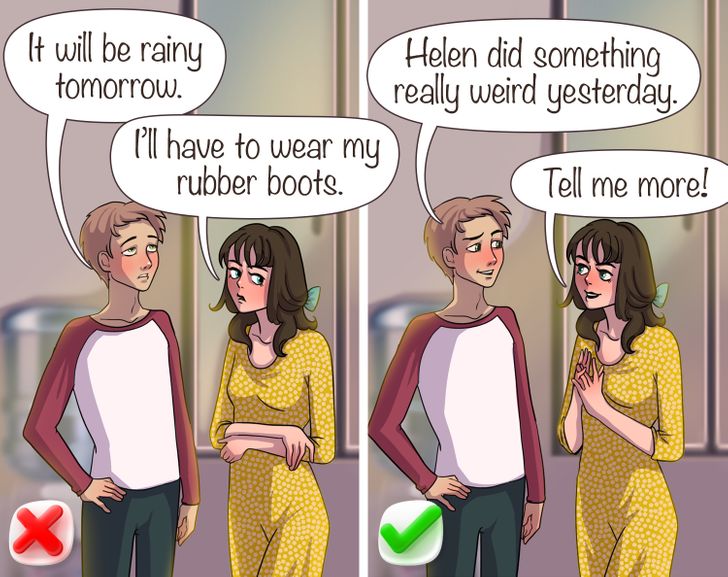
Sharing gossip is good for you, regardless of your personality traits. The level of oxytocin, the so-called love hormone, rises after sharing some gossip about other people and events compared to an ordinary conversation about the weather, for example.
The release of oxytocin makes you closer to other people. From an evolutionary perspective, this means that gossip helps establish group rules, punish violators, exercise social influence through reputation systems, and develop and strengthen social bonds.
In addition, gossip helps you adapt to the environment. For example, it may contain information about someone who got into trouble by violating social norms. This way, the listener will be able to learn something from the experience of another person. Thus, gossip is not always derogatory, but can be handy.
Watching videos about cute animals at work makes you more productive.

Researchers in Japan, led by cognitive psychologist Hiroshi Nittono, found that viewing images of cute baby animals improves subsequent performance with tasks that require behavioral carefulness. This is probably due to narrowing the breadth of attentional focus.
In addition, scientists suggest that baby animals evoke feelings similar to the desire to help and care for something. As a result, it will be easier for an employee to deal with tasks that are associated with interactions with colleagues.
Active procrastination helps you get more things done.
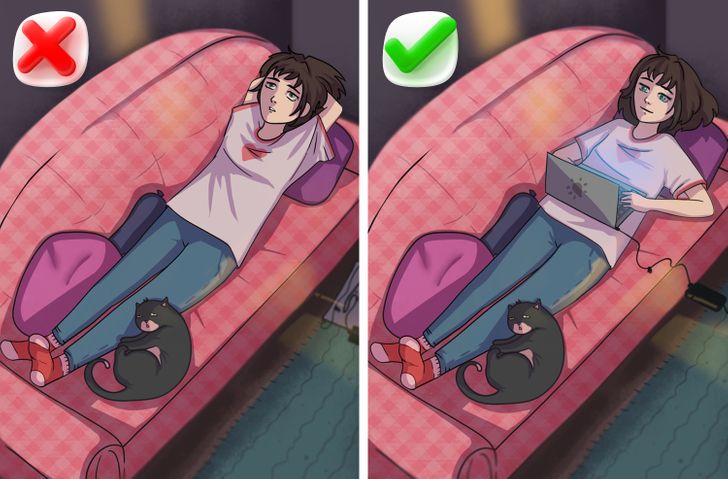
Procrastination is not always bad, especially if it becomes active, not passive. Meaning that you are not just lying on the couch and doing nothing, but putting off an important task, while occupying yourself with other things. This way, you manage to do many little tasks, which increases your productivity in a certain sense.
Besides, during active procrastination, the tasks that seemed unsolvable can be thought over or removed if you find them unnecessary. Sometimes procrastination is the way your mind and intuition tell you that you shouldn’t do something, or that you need to think through things before making a hasty decision.
But if you face a really important or difficult task, it’s fairly natural to postpone it for as long as possible. What’s interesting, though, is that even when you’re actively procrastinating, your mind subconsciously collects ideas and processes them to make you complete the task at the best level possible. This means that when you finally sit down to work, you will have many more ideas in your mind on how to accomplish it.
Swearing can relieve your pain.
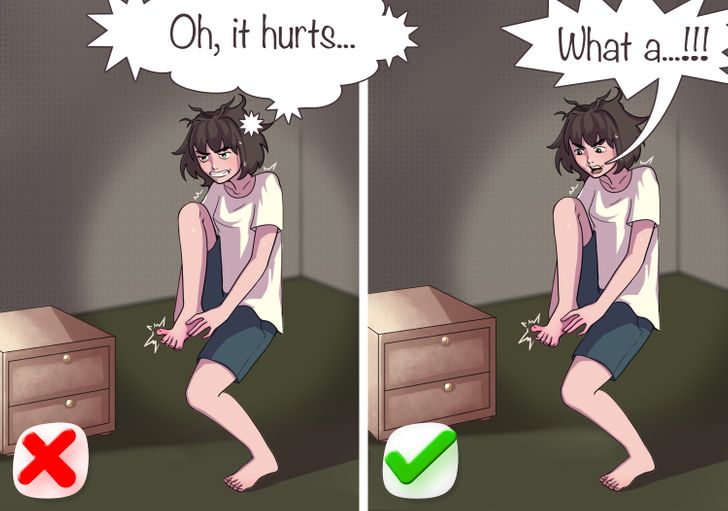
Swearing increases pain tolerance and heart rate compared to the moments when we don’t use swear words. However, it is worth noting that if you use swear words too often, they become less effective.
This happens because the body no longer reacts to them as sharply. So, the main mechanism of this theory by which swearing increases pain tolerance is the provocation of an emotional response.